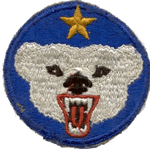World War II in the Aleutians - Shemya (APO 729)
January 26, 1943 to January 27, 1946
1. Recap of Army Facilities
Ft. Benjamine Harrison, Indiana
Ft. McClellan - Anniston, Alabama
Ft. Lawton - Seattle, Washington
4. Shemya
7. My Outfit
8. My Buddies
12. Potpourri
14. Coincidences
Following the sinking of half our Pacific
navy at
of islands in the North and South Pacific, sinking of unarmed merchant ships
in the
Getting millions of men into the military, trained, and ready for combat was
quite a challenge - - - considering that the experienced and better prepared
enemies were many years ahead of us.
Although our entry into previous wars were primarily the result of alliance
commitments, these attacks raised patriotism to an exceptional level.
Young men willing to fight for their country, paid for elective surgery (out of
their own pockets), such as hernias so that they would pass induction exams.
(I knew of an acquaintance and heard of
others).
Both the medical as well as the psychological exams became more lax as the
need for more men lowered the standards. This created problems later on.
BASIC
TRAINING
My experience was with Infantry Basic Training
at
After shuffling around for a few weeks - from Induction Camps to Replacement
Depots, one ended up in a training camp with approx 15,000 to 20,000 others
who came from a variety of lifestyles, social and financial statuses, religions,
educational background, political beliefs, prejudice and racial bias, limited
hygenic standards - - - - a real potpourri of 18 1/2 to 20 year olds, most of
whom were products of the Great Depression.
If an inductee was 21 years or older, and had at least one year of college,
he was whisked away to
School). It made little difference if his major was Ornithology or Flower
Propagation - - - he often ended up leading men into battle. This of course
created more problems later on.
Just to shorten this segment, the intensive 13-week training cycle prepared
you to kill, to avoid being killed, to obey orders and act as a fighting unit
without question, and have a command in the use of armaments. Most
inductees lost about 15 lbs. after the first 21-mile hikes carrying a 60-lb
back pack and an 8-lb, rifle. A few men, who led very sheltered lives
couldn't adjust and had to be mustered out with a medical discharge. Most
survived.
Basic Training was an eye-opener to the tapestry of
residence and culture.
